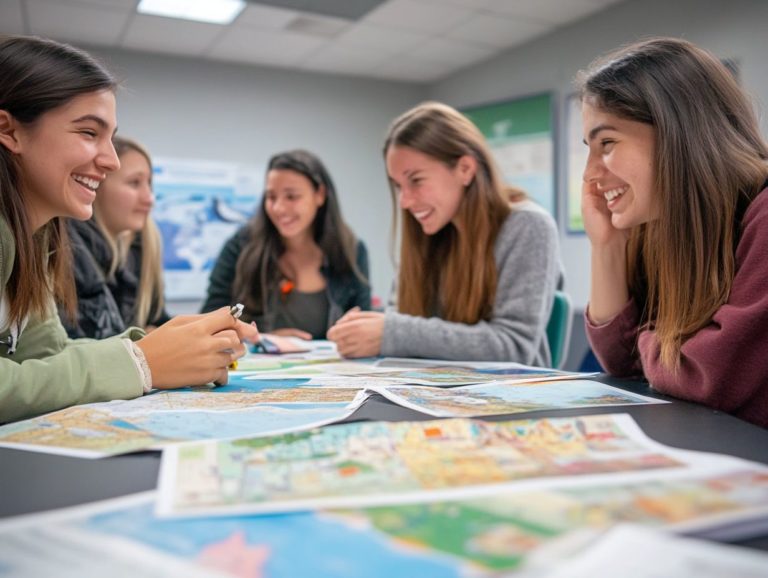What Are the Top Study Abroad FAQs?
Studying abroad can truly transform your life. It provides unparalleled cultural and academic benefits that enhance both personal and professional growth.
This article delves into the essential components of studying overseas. It guides you through what the experience entails while addressing common questions about program options, finances, and the application process.
This article also offers valuable tips on how to prepare for and adjust to life in a new country.
Whether you’re contemplating studying abroad or simply exploring the idea, you’ll discover insights that empower you to make informed decisions.
Contents
Key Takeaways:
- Studying abroad allows for cultural and academic growth, making it a valuable experience for personal and professional development.
- Key questions include program options, finances, the application process, and living abroad logistics.
- Prepare well and you’ll set yourself up for success in your study abroad experience.
What is Studying Abroad?
Studying abroad is an enriching adventure. It takes you beyond your home country and offers a unique chance to immerse yourself in diverse cultures while pursuing your academic aspirations.
Institutions like the University of Iowa provide structured international programs. These enable you to acquire valuable language skills and cultural insights key elements for personal and professional growth in our increasingly interconnected world.
This transformative experience can take many forms. You might participate in traditional semester-long exchanges, short-term study tours, internships, or research programs. All are designed to expand your horizons.
Engaging in these programs not only deepens your academic knowledge but also cultivates a broader understanding of global perspectives and diverse lifestyles.
As you explore these opportunities, you can lean on support systems such as academic advisors and global education offices. These essential resources guide you through application processes, help align your course selections, and assist with any logistical concerns.
With their support, you ll feel prepared and confident as you embark on your international journey, ultimately enriching your educational experience in ways you may have never imagined.
Benefits of Studying Abroad
Studying abroad presents many benefits. You gain enhanced language skills, immerse yourself in diverse cultures, and acquire invaluable academic advantages that can profoundly enrich your educational journey.
Many students discover that their experiences abroad cultivate strong intercultural communication skills and adaptability. This ultimately gives them a competitive edge in the global job market.
Cultural and Academic Advantages
The cultural and academic advantages of studying abroad offer a transformative experience. This significantly elevates both your personal growth and educational achievement.
As you engage with diverse communities and experience different academic environments, you embrace opportunities that broaden your horizons.
These encounters deepen your understanding of various worldviews and challenge your preconceived notions. This allows you to cultivate rich intercultural communication skills.
By immersing yourself in diverse teaching methodologies, you gain a broader academic perspective. This often includes course requirements unavailable in your home country.
This unique exposure sharpens your language skills, essential for effective communication in our increasingly globalized world. You ll find yourself adapting to and integrating into new cultural practices.
This enhances your ability to collaborate within multicultural teams, a vital competence in today s interconnected landscape.
Common Questions about Studying Abroad
As you contemplate the prospect of studying abroad, it’s natural to have many questions about your journey. You may ponder everything from the diverse program options available to the intricacies of financial aid and the application process itself. To help you navigate these uncertainties, check out the most common study abroad questions, which can often feel overwhelming.
FAQs about Program Options
When you delve into study abroad programs, it s natural to want to explore the array of options available. Options range from intensive language courses to exchange opportunities and offerings from various providers. Each option delivers a distinctive experience.
Among these, university exchange programs stand out. They allow you to study at partner institutions abroad for a semester or a year. This experience fully immerses you in a new academic and cultural environment.
Third-party program providers like CIEE and IES Abroad present tailored packages. These packages include housing, activities, and local support, ensuring your transition is as smooth as possible.
If you’re looking for something particularly enriching, consider intensive language courses in countries like Spain or Japan. These programs offer courses that sharpen your fluency and allow you to explore local customs in depth.
Every program type enriches your academic knowledge while fostering personal growth. This nurtures global citizenship, which means understanding and respecting cultural diversity an essential skill in today s interconnected world.
FAQs about Finances
Understanding the costs of studying abroad is essential. Many students seek financial aid and scholarships to support their journey.
These expenses typically include tuition fees, which can fluctuate based on the institution and country. You should also account for housing costs, which might cover rent, utilities, and groceries.
Living expenses such as transportation, personal items, and leisure activities can accumulate quickly. Budgeting is an invaluable skill for anyone embarking on this exciting adventure.
Many students successfully navigate these financial responsibilities by exploring various financial aid packages and local and international scholarships. Part-time job opportunities may also be available.
Create a comprehensive budget plan that outlines all anticipated costs. Doing so enables better financial management and paves the way for a smoother study abroad experience.
FAQs about Application Process
Navigating the application process can feel like a daunting journey for many students. It involves meeting specific academic standards, adhering to program deadlines, and securing the necessary student visas.
To begin on the right foot, focus on conducting thorough research. Identify programs that resonate with your academic goals and interests.
After narrowing down your options, gather the necessary documentation. This includes transcripts, letters of recommendation, and well-crafted personal statements. Each program often has unique requirements, so paying close attention to detail is crucial.
Once your documentation is in order, submitting everything on time is vital for ensuring you receive due consideration. Don t overlook the student visa application. Understanding the visa criteria, tracking important processing times, and meeting any additional requirements set by institutions can make all the difference in your study abroad experience.
FAQs about Living Abroad
Living abroad is an exciting adventure filled with opportunities! You’ll want to secure suitable housing arrangements, understand health and safety protocols, and fully immerse yourself in the cultural experiences the host country has to offer.
Your housing options include university dormitories, shared apartments, and homestays with local families. Each option provides distinct perspectives and opportunities for personal growth.
Be sure to get to know your new environment. Familiarizing yourself with health and safety regulations specific to your new location will enhance your security and overall enjoyment during your stay.
Embracing the cultural richness of your host country will sharpen your adaptation skills. It will also impart invaluable life lessons, turning your journey into a truly rewarding and transformative experience.
Tips for a Successful Study Abroad Experience
Achieving a successful study abroad experience relies heavily on your preparation and the strategic adjustments you make along the way.
As you navigate new environments that challenge your cultural and academic norms, you’ll also have the chance to refine essential communication skills that will serve you well in the future.
Preparation and Adjustment Strategies
Preparation for studying abroad goes beyond mere logistical planning; it includes cultivating the ability to cope with challenges and being open to new cultures required for successful integration into a new environment. The help available for students often plays a vital role in this journey.
Immerse yourself in the local culture. This can enhance your overall experience. Researching local customs, traditions, and even the nuances of language can profoundly impact your everyday interactions.
Don t overlook health preparations, such as understanding healthcare access and securing insurance coverage. These steps are crucial for ensuring your well-being throughout your study period. Recognizing the importance of logistics like housing, transportation, and budgeting will create a smoother transition for you.
By fully utilizing available student support resources, you can effectively navigate challenges, transforming your journey into not just a feasible one, but a truly fulfilling adventure!
Common Questions about Studying Abroad
What are the top study abroad destinations?
The top study abroad destinations vary depending on personal interests, but some popular choices include France, Italy, Spain, Australia, and the United Kingdom. It’s important to research and consider factors such as cost, culture, and academic programs before choosing a destination.
What are the requirements for studying abroad?
Requirements for studying abroad can vary depending on the program and destination. Generally, students will need a valid passport, a student visa, proof of enrollment in a university or college, and possibly a specific GPA requirement. It’s important to check with the specific program and destination for their specific requirements.
What are the benefits of studying abroad?
Studying abroad offers many benefits, including the opportunity to immerse yourself in a new culture, gain a global perspective, improve language skills, enhance your resume, and make new connections and friendships. It also allows for personal growth and development.
What are the costs associated with studying abroad?
The costs associated with studying abroad can vary greatly depending on the program and destination. Some common expenses include tuition, housing, transportation, food, and travel. It’s important to carefully budget and research the costs before choosing a program and destination.
What are the best resources for finding study abroad programs?
There are many resources available for finding study abroad programs, including university study abroad offices, online search engines, and study abroad fairs. It’s also helpful to speak with current or former study abroad students for their recommendations and experiences.
What are the steps to apply for a study abroad program?
The steps to apply for a study abroad program may vary, but generally include researching and selecting a program, completing an application, submitting required documents, and possibly participating in an interview. It’s important to carefully follow the application instructions and deadlines provided by the program.
Start planning your adventure today!






